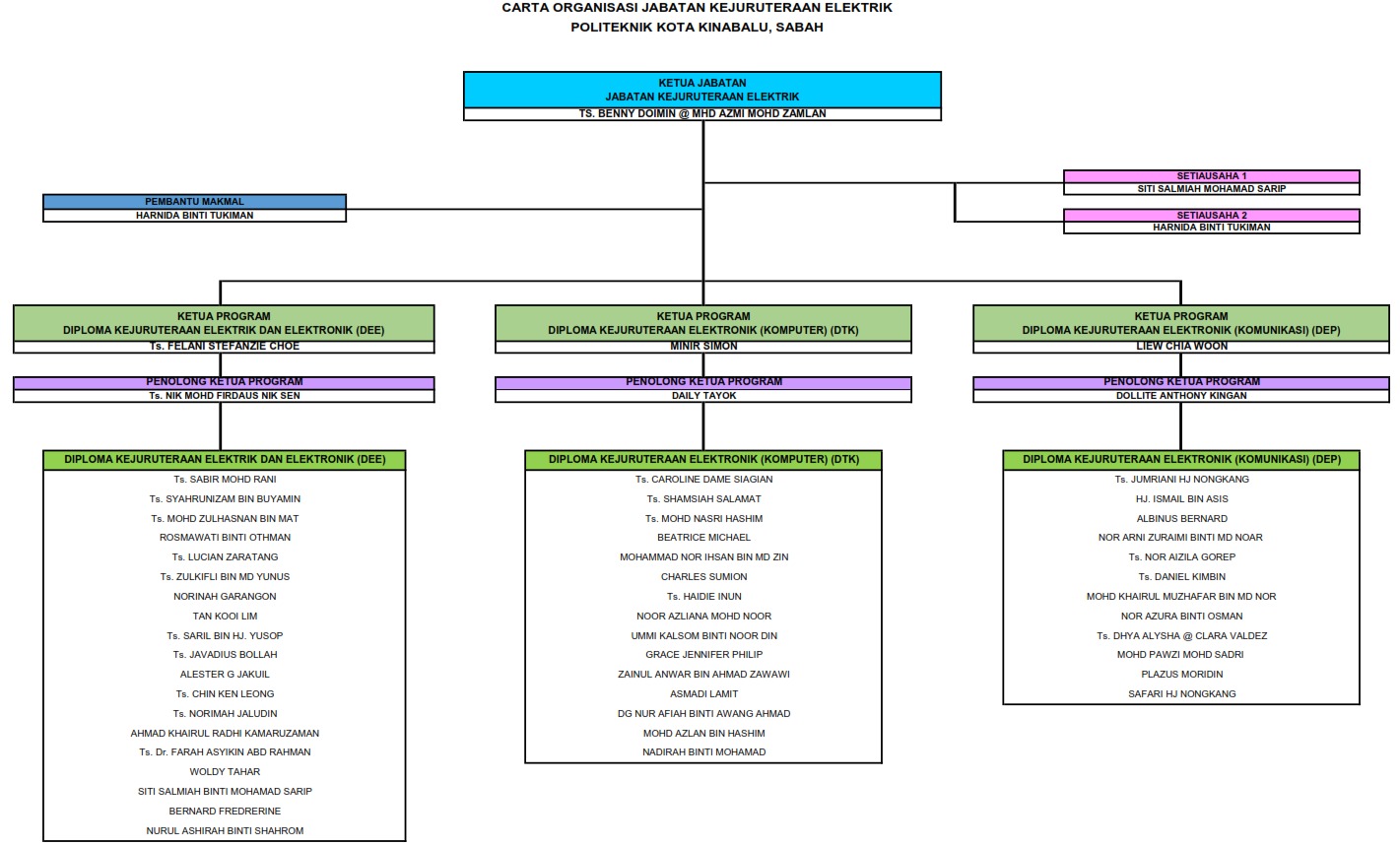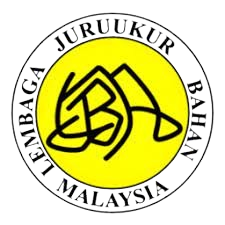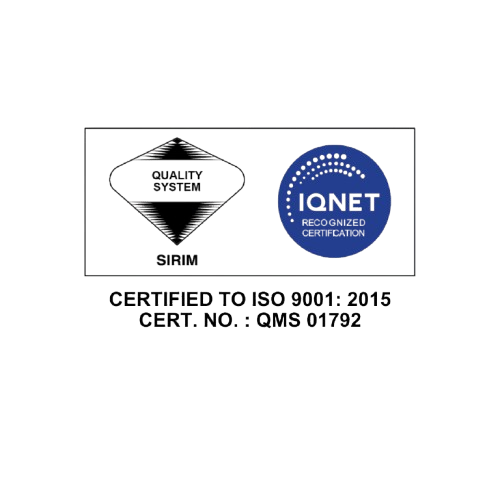JABATAN KEJURUTERAAN ELEKTRIK
- Details
- Hits: 9326
JABATAN KEJURUTERAAN ELEKTRIK
Pengenalan Jabatan
Jabatan Kejuruteraan Elektrik (JKE) merupakan salah satu dari 5 jabatan induk yang terdapat di Politeknik Kota Kinabalu (PKK), Sabah. JKE, PKK menawarkan peluang kepada pelajar untuk menerokai bidang kejuruteraan elektrik, elektronik, komunikasi dan komputer. Matlamat jabatan ini adalah untuk menghasilkan graduan-graduan berkualiti dan berketrampilan bagi memenuhi keperluan teknologi terkini dan menjana perkembangan industri negara. Pendekatan yang digunakan dalam proses Pengajaran dan Pembelajaran adalah secara teori dan praktikal yang berorientasikan sistem Outcome Based Education (OBE) iaitu pembelajaran berpusatkan kepada pelajar dan menitikberatkan dapatan daripada hasil pembelajaran dan bukan sekadar objektif pengajaran semata-mata dengan kemudahan infrastuktur seperti bengkel, makmal dan bilik kuliah dikukuhkan lagi dengan pendedahan pengalaman alam pekerjaan yang sebenar iaitu Latihan Industri (LI) yang dilaksanakan secara berstruktur bersama rakan industri.
JKE, PKK di terajui oleh seorang Ketua Jabatan dan dibantu dengan tiga orang Ketua Program merujuk kepada program masing-masing.
JKE, PKK mempunyai kekuatan tenaga kerja yang terdiri daripada pelbagai latar belakang akademik dan kemahiran. Pengambilan pelajar diadakan setiap semester iaitu setiap 6 bulan sekali berdasarkan kepada tiga program.
Program-program yang ditawarkan di Jabatan Kejuruteraan Elektrik adalah:
- Diploma Kejuruteraan Elektrik & Elektronik (DEE) / Diploma in Electrical and Electronic Engineering (DEE)
- Diploma Kejuruteraan Elektronik (Komunikasi) (DEP) / Diploma in Electronic Engineering (Communication) (DEP)
- Diploma Kejuruteran Elektronik (Komputer) (DTK) / Diploma in Electronic Engineering (Computer) (DTK)
Kurikulum
- Jabatan Kejuruteraan Elektrik menggunakan kurikulum yang sama seperti semua Politeknik Kementerian Pendidikan Malaysia (Pendidikan Tinggi).
- Kursus terdiri daripada kursus umum, kursus teras dan kursus elektif mengikut bidang Elektrik dan Elektronik, Elektronik (Komunikasi) dan Elektronik (Komputer)
Tempoh Pengajian
3 Tahun (6 Semester)
DEE
|
ACCREDITATION CODE |
MQA/FA9422 |
||||||||||||||||||||||||
|
INTRODUCTION |
Electrical engineering is the field of study which generally deals with the application of electrical and electronics towards designing, testing and development of circuitry and equipment for well-defined engineering activities. It requires the application of scientific and engineering knowledge and methods combined with practical skills in supporting well-defined engineering activities to prepare students for their future role in the industry. The electrical engineering diploma graduates of the Polytechnic’s Ministry of Higher Education are exposed to a comprehensive curriculum consisting of courses in personal development, mathematics, science, electrical disciplines and workplace competencies requirements. Graduates of the electrical engineering diploma programme will be equipped with specialized knowledge and skills which include power engineering, green technology, energy efficiency, computer technology, communication, medical electronics, optoelectronic and industrial automation. The Diploma in Electrical and Electronic Engineering is a three-year full-time programme comprising of five semesters coursework with one full semester of industrial training. |
||||||||||||||||||||||||
|
SYNOPSIS |
The Diploma in Electrical and Electronic Engineering programme is designed to cover the broad discipline of electrical and electronic engineering which includes electrical and electronic principles, computer fundamental and programming, computer aided design, semiconductor devices, communication systems, wiring installation, power system, electrical machine and programmable logic controller. The green technology elements are also incorporate in the curriculum to provide awareness towards the importance of the sustainable energy. |
||||||||||||||||||||||||
|
PROGRAMME AIMS |
This programme believes that all individuals have potential to be a resourceful and adaptable technician to support the nation aspiration in providing engineering talent |
||||||||||||||||||||||||
|
The engineering programme should produce balanced TVET graduates who are:
|
|||||||||||||||||||||||||
|
Upon completion of the programme, students should be able to:
Notes: DK 1: A descriptive, formula-based understanding of the natural sciences applicable in a sub-discipline DK 2: Procedural mathematics, numerical analysis, statistics applicable in a subdiscipline DK 3: A coherent procedural formulation of engineering fundamentals required in an accepted sub-discipline DK 4: Engineering specialist knowledge that provides the body of knowledge for an accepted sub-discipline DK 5: Knowledge that supports engineering design based on the techniques and procedures of a practice area DK 6: Codified practical engineering knowledge in recognised practice area DK 7: Knowledge of issues and approaches in engineering technician practice: ethics, financial, cultural, environmental and sustainability impacts |
|||||||||||||||||||||||||
|
JOB PROSPECT |
This programme provides the knowledge and skills in electrical engineering that can be applied to a broad range of careers in most power generation provider and manufacturing industries. The knowledge and skills that the students acquire from the programme will enable them to participate in the job market as:
|
||||||||||||||||||||||||
|
ENTRY REQUIREMENTS |
For more information regarding the admission requirements for the Malaysian Polytechnic Program, please refer portal Ambilan Pelajar Mypolycc at https://ambilan.mypolycc.edu.myhttps://ambilan.mypolycc.edu.my/portalbpp2/index.asp?pg=program&kat=d&id=DE007 |
DTK
|
ACCREDITATION CODE |
MQA/FA13235 |
||||||||||||||||||||||||
|
INTRODUCTION |
Electrical engineering is the field of study which generally deals with the application of electrical and electronics towards designing, testing and development of circuitry and equipment for well-defined engineering activities. It requires the application of scientific and engineering knowledge and methods combined with practical skills in supporting well-defined engineering activities to prepare students for their future role in the industry. The electrical engineering diploma graduates of the Polytechnic’s Ministry of Higher Education are exposed to a comprehensive curriculum consisting of courses in personal development, mathematics, science, electrical disciplines and workplace competencies requirements. Graduates of the electrical engineering diploma programme will be equipped with specialized knowledge and skills which include power engineering, green technology, energy efficiency, computer technology, communication, medical electronics, optoelectronic and industrial automation. The Diploma in Electronic Engineering (Computer) is a three-year full-time programme comprising of five semesters coursework with one full semester of industrial training. |
||||||||||||||||||||||||
|
SYNOPSIS |
The Diploma in Electronic Engineering (Computer) covers broad discipline of electronics engineering, with specialization in computer technology which includes electrical and electronic fundamentals, computer fundamentals and programming, semiconductor devices and computer aided design while emphasizing the area of specialization. The specialization courses include microprocessor fundamental, computer architecture and organization, database system, operating system, internet based controller, computer diagnosis and maintenance, CMOS IC design and fabrication and project. |
||||||||||||||||||||||||
|
PROGRAMME AIMS |
This programme believes that all individuals have potential to be a resourceful and adaptable technician to support the nation aspiration in providing engineering talent |
||||||||||||||||||||||||
|
The engineering programme should produce balanced TVET graduates who are:
|
|||||||||||||||||||||||||
|
Upon completion of the programme, students should be able to:
Notes: DK 1: A descriptive, formula-based understanding of the natural sciences applicable in a sub-discipline DK 2: Procedural mathematics, numerical analysis, statistics applicable in a subdiscipline DK 3: A coherent procedural formulation of engineering fundamentals required in an accepted sub-discipline DK 4: Engineering specialist knowledge that provides the body of knowledge for an accepted sub-discipline DK 5: Knowledge that supports engineering design based on the techniques and procedures of a practice area DK 6: Codified practical engineering knowledge in recognised practice area DK 7: Knowledge of issues and approaches in engineering technician practice: ethics, financial, cultural, environmental and sustainability impacts |
|||||||||||||||||||||||||
|
JOB PROSPECT |
This programme provides the knowledge and skills in electronics engineering that can be applied to a broad range of careers related to computer technology. The knowledge and skills that the students acquire from the programme will enable them to participate in the job market as:
|
||||||||||||||||||||||||
|
ENTRY REQUIREMENTS |
For more information regarding the admission requirements for the Malaysian Polytechnic Program, please refer portal Ambilan Pelajar Mypolycc at |
DEP
|
ACCREDITATION CODE |
MQA/FA13177 |
||||||||||||||||||||||||
|
INTRODUCTION |
Electrical engineering is the field of study which generally deals with the application of electrical and electronics towards designing, testing and development of circuitry and equipment for well-defined engineering activities. It requires the application of scientific and engineering knowledge and methods combined with practical skills in supporting well-defined engineering activities to prepare students for their future role in the industry. The electrical engineering diploma graduates of the Polytechnic’s Ministry of Higher Education are exposed to a comprehensive curriculum consisting of courses in personal development, mathematics, science, electrical disciplines and workplace competencies requirements. Graduates of the electrical engineering diploma programme will be equipped with specialized knowledge and skills which include power engineering, green technology, energy efficiency, computer technology, communication, medical electronics, optoelectronic and industrial automation. The Diploma in Electronic Engineering (Communication) is a three-year full-time programme comprising of five semesters coursework with one full semester of industrial training. |
||||||||||||||||||||||||
|
SYNOPSIS |
The Diploma in Electronic Engineering (Communication) covers broad discipline of electronics engineering, with specialization in communication technology which includes, electrical and electronic fundamentals, computer fundamentals and programming, communication system fundamentals, semiconductor devices, and computer aided design, while emphasizing the area of specialization. The specialization courses include telecommunication network, fibre optic communication system, data communication and networking, wireless communication and microwave devices. |
||||||||||||||||||||||||
|
PROGRAMME AIMS |
This programme believes that all individuals have potential to be a resourceful and adaptable technician to support the nation aspiration in providing engineering talent |
||||||||||||||||||||||||
|
The engineering programme should produce balanced TVET graduates who are:
|
|||||||||||||||||||||||||
|
Upon completion of the programme, students should be able to:
Notes: DK 1: A descriptive, formula-based understanding of the natural sciences applicable in a sub-discipline DK 2: Procedural mathematics, numerical analysis, statistics applicable in a subdiscipline DK 3: A coherent procedural formulation of engineering fundamentals required in an accepted sub-discipline DK 4: Engineering specialist knowledge that provides the body of knowledge for an accepted sub-discipline DK 5: Knowledge that supports engineering design based on the techniques and procedures of a practice area DK 6: Codified practical engineering knowledge in recognised practice area DK 7: Knowledge of issues and approaches in engineering technician practice: ethics, financial, cultural, environmental and sustainability impacts |
|||||||||||||||||||||||||
|
JOB PROSPECT |
This programme provides the knowledge and skills in communication engineering that can be applied to a broad range of careers in most electronic communication field. The knowledge and skills that the students acquire from the programme will enable them to participate in the job market as:
|
||||||||||||||||||||||||
|
ENTRY REQUIREMENTS |
For more information regarding the admission requirements for the Malaysian Polytechnic Program, please refer portal Ambilan Pelajar Mypolycc at |
DEE 2024
DIPLOMA IN ELECTRICAL AND ELECTRONIC ENGINEERING (DEE)
|
ACCREDITATION CODE |
MQA/FA9422 |
||||||||||||||||||||||
|
INTRODUCTION |
The Electrical Engineering Diploma graduates of the polytechnic’s Ministry of Higher Education are exposed to a comprehensive curriculum consisting of courses in personal development, mathematics, science, electrical engineering disciplines and workplace competencies requirements. The Diploma in Electrical and Electronic Engineering programme covers broad discipline of electrical and electronics engineering fundamental courses, computer technologies-based courses and specialization courses. The electrical and electronic engineering is the field of study which generally deals with the application of electrical and electronics towards designing, testing and development of circuitry and equipment for well-defined engineering activities. It requires the application of scientific and engineering knowledge and methods combined with practical skills in supporting well-defined engineering activities to prepare students for their future role in the industry. The Diploma in Electrical and Electronic Engineering graduates of the programme have the prospect of working in the electric and electronic industries, computer-based technology industry and integrated circuit design, fabrication and packaging industry. The programme will produce balanced Technical and Vocational Education and Training (TVET) graduates who contribute to society ethically, engage in enterprising activities, continuously developing professionally and adapt to technology changes. |
||||||||||||||||||||||
|
SYNOPSIS |
The Diploma in Electrical and Electronic Engineering programme includes the discipline of electrical and electronics engineering fundamental courses, computer technologies based courses and specialization courses. The engineering fundamental courses are electrical wiring, semiconductor devices, electronic circuits, digital electronics, electrical circuit 1 and 2 . The computer technology- based courses are comprised of programming fundamentals, computer aided design and embedded system applications. The specialization courses are renewable energy, programable logic control, power electronic, power system and final year project. The green technology elements are also incorporate in the curriculum to provide awareness towards the importance of the sustainable energy. |
||||||||||||||||||||||
|
PROGRAM AIMS |
This programme believes that all individuals have the potential to be resourceful and adaptable technicians to support the nation’s aspiration in providing engineering talent. |
||||||||||||||||||||||
|
PROGRAMME EDUCATIONAL OBJECTIVES (PEO) |
The engineering programme should produce balanced TVET graduates who are:
|
||||||||||||||||||||||
|
PROGRAMME LEARNING OUTCOMES (PLO) |
Upon completion of the programme, students should be able to:
*Represented by the 17 UN Sustainable Development Goals (UN-SDG). |
||||||||||||||||||||||
|
JOB PROSPECT |
This programme provides the knowledge and skills in electrical engineering that can be applied to a broad range of careers in most power generation provider and manufacturing industries. The knowledge and skills that the students acquire from the programme will enable them to participate in the job market such as:
|
||||||||||||||||||||||
|
ENTRY REQUIREMENT |
For more information regarding the admission requirements for the Malaysian Polytechnic Program, please refer portal Ambilan Pelajar Mypolycc at https://ambilan.mypolycc.edu.my/portalbpp2/index.asp?pg=program&kat=d&id=DE007 |
DEP 2024
DIPLOMA IN ELECTRONIC ENGINEERING (COMMUNICATION) (DEP)
|
ACCREDITATION CODE |
MQA/FA13177 |
||||||||||||||||||||||
|
INTRODUCTION |
The Electrical Engineering Diploma graduates of the polytechnic’s Ministry of Higher Education are exposed to a comprehensive curriculum consisting of courses in personal development, mathematics, science, electrical engineering disciplines and workplace competencies requirements. The Diploma in Electronic Engineering (Communication) covers broad discipline of electronics engineering fundamentals, computer-based technology, and specialization. The computer-based technologies and specialization disciplines are comprised of software-hardware interfacing application through the internet, data networking, wired and wireless communication technology. Additionally, the program emphasizes practical skills essential for tasks such as system maintenance, installation, testing and troubleshooting. The graduates of the programme will have the prospect of working in the electronics, telecommunications, and networking industry. The programme will produce balanced Technical and Vocational Education and Training (TVET) graduates who contribute to society ethically, engage in enterprising activities, continuously developing professionally and adapt to technology changes. |
||||||||||||||||||||||
|
SYNOPSIS |
The Diploma in Electronic Engineering (Communication) programme includes the discipline of electronics engineering fundamental courses, computer technologies-based courses and specialization courses. The engineering fundamental courses are electrical wiring, semiconductor devices, measurement, electronic circuits, digital electronics, electrical technology, programming fundamentals, computer aided electrical drawing, electronic computer aided design, electronic equipment repair and fundamental communication system. The computer technology-based courses are comprised of computer vision programming, and internet of things devices applications. The specialization courses are microwaves engineering, data communication and networking, cellular communication system, fiber optic communication system and final year project. |
||||||||||||||||||||||
|
PROGRAM AIMS |
This programme believes that all individuals have the potential to be resourceful and adaptable technicians to support the nation’s aspiration in providing engineering talent. |
||||||||||||||||||||||
|
PROGRAMME EDUCATIONAL OBJECTIVES (PEO) |
The engineering programme should produce balanced TVET graduates who are:
|
||||||||||||||||||||||
|
PROGRAMME LEARNING OUTCOMES (PLO)
|
Upon completion of the programme, students should be able to:
*Represented by the 17 UN Sustainable Development Goals (UN-SDG) |
||||||||||||||||||||||
|
JOB PROSPECT
|
This programme provides the knowledge and skills in communication engineering that can be applied to a broad range of careers in most electronic communication field. The knowledge and skills that the students acquire from the programme will enable them to participate in the job market such as: a. Assistant Engineer b. Assistant Radio Frequency c. Engineer Technical Executive d. Marketing Executive e. Technical Supervisor f. Assistant Technical Designer g. Assistant Network Engineer h. Assistant Network Administrator i. Assistant Drive Test Engineer j. Assistant Drive Test Analyser Engineer k. Network Planner l. Electrical/Electronic Technician m. Technopreneur n. Technical Officer o. Project Administrator
|
||||||||||||||||||||||
|
ENTRY REQUIREMENT
|
For more information regarding the admission requirements for the Malaysian Polytechnic Program, please refer portal Ambilan Pelajar Mypolycc at https://ambilan.mypolycc.edu.my/portalbpp2/index.asp?pg=program&kat=d&id=DE004 |
DTK 2024
|
ACCREDITATION CODE |
MQA/FA13235 |
||||||||||||||||||||||
|
INTRODUCTION |
The Electrical Engineering Diploma graduates of the polytechnic’s Ministry of Higher Education are exposed to a comprehensive curriculum consisting of courses in personal development, mathematics, science, electrical engineering disciplines and workplace competencies requirements.
The Diploma in Electronic Engineering (Computer) programme covers broad discipline of electronics engineering fundamentals, computer-based technologies and specialization. The computer-based technologies and specialization disciplines are comprised of computer system components which support the Industry Revolution 4.0, such as open-source software and programming tools, software-hardware interfacing application through the internet, computer system, computer vision, networking and integrated circuits design, fabrication and testing.
The graduates of the programme have the prospect of working in the electronics industry, computer-based technology industry and integrated circuit design, fabrication and packaging industry. The programme will produce balanced Technical and Vocational Education and Training (TVET) graduates who contribute to society ethically, engage in enterprising activities, continuously developing professionally and adapt to technology changes. |
||||||||||||||||||||||
|
SYNOPSIS |
The Diploma in Electronic Engineering (Computer) programme includes the discipline of electronics engineering fundamental courses, computer technologies-based courses and specialization courses. The engineering fundamental courses are semiconductor devices, electronic circuits, digital electronics, electrical circuit, electrical wiring, programming fundamentals, computer aided electrical drawing, and electronic computer aided design. The computer technology-based courses are comprised of embedded system applications, microprocessor, computer networking fundamentals, CMOS integrated circuit design and fabrication, computer vision programming, and internet of things devices applications. The specialization courses are database system, operating systems, computer system diagnosis and maintenance, computer vision programming, and final year project. |
||||||||||||||||||||||
|
PROGRAM AIMS |
This programme believes that all individuals have the potential to be resourceful and adaptable technicians to support the nation’s aspiration in providing engineering talent. |
||||||||||||||||||||||
|
PROGRAMME EDUCATIONAL OBJECTIVES (PEO) |
The engineering programme should produce balanced TVET graduates who are:
|
||||||||||||||||||||||
|
PROGRAMME LEARNING OUTCOMES (PLO) |
Upon completion of the programme, students should be able to:
*Represented by the 17 UN Sustainable Development Goals (UN-SDG)
|
||||||||||||||||||||||
|
JOB PROSPECT |
This programme provides the knowledge and skills in communication engineering that can be applied to a broad range of careers in most electronic communication field. The knowledge and skills that the students acquire from the programme will enable them to participate in the job market such as:
|
||||||||||||||||||||||
|
ENTRY REQUIREMENT |
For more information regarding the admission requirements for the Malaysian Polytechnic Program, please refer portal Ambilan Pelajar Mypolycc at https://ambilan.mypolycc.edu.my/portalbpp2/index.asp?pg=program&kat=d&id=DE004 |















